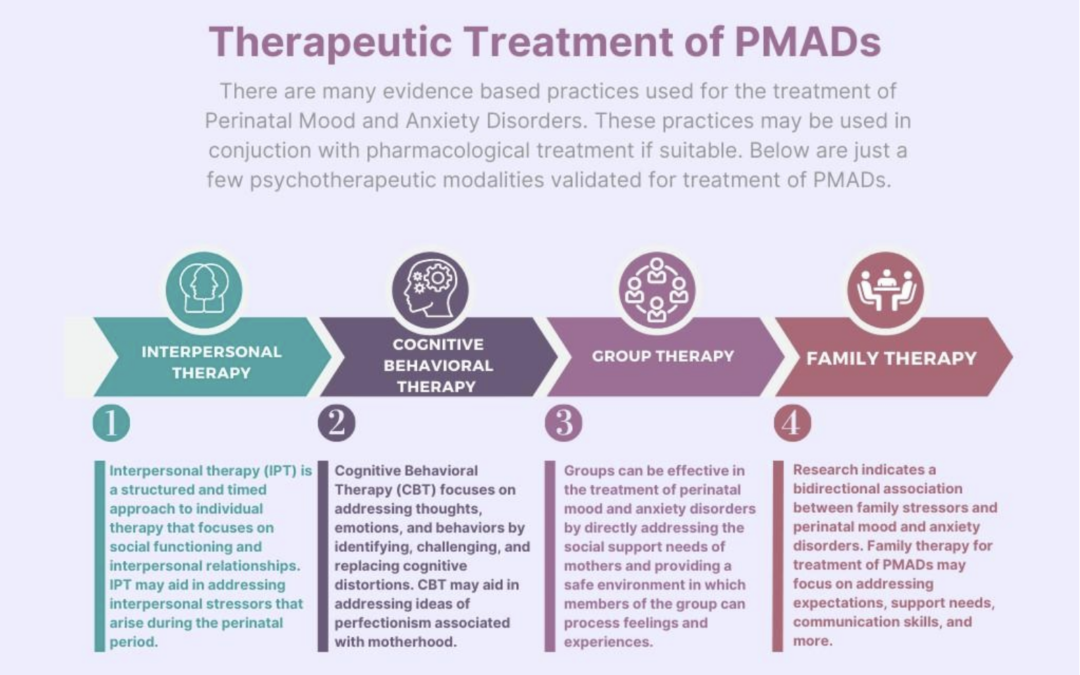By: Becky Spencer, PhD, APRN, PMHNP-BC, IBCLC, PMH-C, FILCA
Perinatal Mood and Anxiety Disorders (PMADs) impact overall well-being and daily functioning during pregnancy and throughout birth. In many cases, symptoms that are left untreated can become chronic or recurring throughout a woman’s lifetime. Treatment for PMADs can vary depending on severity of the
symptoms and the condition. In addition to recommendations for treatment with medication, therapy may be recommended by your provider. Understanding therapeutic treatment options can help with figuring out what types of therapists and therapeutic modalities to look for when searching for what works best for you. Below is a list of some of the evidence-based treatment modalities used when working with PMADs.
Interpersonal Therapy (IPT)
Interpersonal therapy (IPT) is a structured and timed approach to individual therapy that focuses on social functioning and interpersonal relationships. IPT focuses on four main areas of a client’s life: conflict in relationships with others that may be a source of tension, life changes or transitions such as the birth of a child or change in careers, grief and loss, and problems experienced with forming or sustaining healthy relationships with others. IPT is 12-16 weeks in duration and sessions are structured to identify and address problem areas in the first phase, implement and practice healthy coping mechanisms in the second phase, and develop a transition and recovery plan in the third and final phase of treatment. Studies on the efficacy of IPT in treating PMADs indicate IPT is effective when used alone, when combined with medication treatment, when used during and after pregnancy, and when combined with group work (Stuart, 2012).
Cognitive Behavioral Therapy (CBT)
Cognitive Behavioral Therapy (CBT) is a common form of talk therapy that focuses on addressing thoughts, emotions, and behaviors by identifying, challenging, and replacing cognitive distortions. These irrational thoughts also known as automatic negative thoughts, are a form of self-talk that is involuntary and instantaneous in nature. Many of these thoughts contribute to feelings of depression, anxiety, and other mental health conditions. Your therapist will work with you to identify these unhelpful thinking patterns and interrupt and challenge them through the use of journaling, positive-self talk, using problem-solving skills and more. CBT may also be integrated with mindfulness therapy or other forms of behavior therapy. Research indicates that CBT is effective in the treatment of PMADs during and after pregnancy as well as when used in group therapy (Lowndes et al., 2019).
Group Therapy
Group therapy involves one or more therapists working with several people at the same time. Groups generally have around 8 people but can be smaller or larger depending on the type of group and modality being used.
Sessions last longer than individual sessions and are generally about two hours long. Group therapy may integrate different types of modalities such as the ones mentioned above or can be psychoeducational in nature. Groups can be effective in the treatment of perinatal mood and anxiety disorders by directly addressing the social support needs of mothers and providing a safe environment in which members of the group can process feelings and experiences. This may aid group members in feeling less isolated, normalizing their feelings and experiences, and provide a space to receive support and feedback from group members and clinical staff (Goodman & Santangelo, 2011).
Family Therapy
Family therapy is a type of treatment in which all or all available family members participate in sessions together. Family therapy helps by focusing on how family members interact with each other and addressing how these interactions may impact each individual member’s functioning within the family system and addressing how the overall family system is impacted. Research indicates a bidirectional association between family stressors and perinatal mood and anxiety disorders. Family therapy is believed to help in relieving symptoms of PMADs by providing a space for discussing expectations, targeting communication and conflict resolution skills, and discussing the overall transition into parenthood (Cluxton-Keller, & Bruce, 2018).
Finding a Therapist or Treatment Provider
Deciding what type of therapy or therapist to seek is a process unique to you and your needs. Many therapists or counseling offices will offer complimentary screenings or consultations. I encourage you to utilize these services when available and ask questions about what treatment looks like and what you can expect. In
addition, Postpartum Support International is an online organization dedicated to raising awareness and
aiding in providing or finding treatment for PMADs. They have an online provider directory that you can
search to find a psychiatric provider or a therapist in your state. We want you to know that if you are experiencing symptoms of a perinatal mood and anxiety disorder, you are not alone, and you can get better. Help is available.
References
Cluxton-Keller, F., & Bruce, M. L. (2018). Clinical effectiveness of family therapeutic interventions in the prevention and treatment of perinatal depression: A systematic review and meta-analysis. PLoS ONE, 13(6), 1–18. https://doiorg.libproxy.lamar.edu/10.1371/journal.pone.0198730
Goodman, J., & Santangelo, G. (2011). Group treatment for postpartum depression: a systematic review. Archives of Women’s Mental Health, 14(4), 277–293. https://doi-org.libproxy.lamar.edu/10.1007/s00737-011- 0225-3
Lowndes, T. A., Egan, S. J., & McEvoy, P. M. (2019). Efficacy of brief guided self-help cognitive behavioral treatment for perfectionism in reducing perinatal depression and anxiety: a randomized controlled trial. Cognitive Behaviour Therapy, 48(2), 106–120. https://doi- org.libproxy.lamar.edu/10.1080/16506073.2018.1490810
Stuart S. (2012). Interpersonal psychotherapy for postpartum depression. Clinical Psychology & Psychotherapy, 19(2), 134–140. https://doi.org/10.1002/cpp.1778
Postpartum.net https://www.postpartum.net/get-help/locations/

